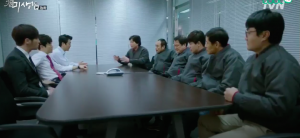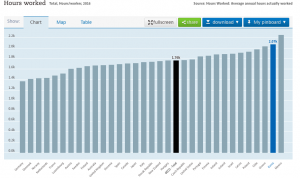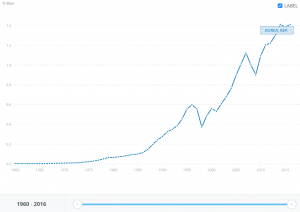Synopsis:
[episode 16] Geu-rae, Young-yi and Baek-ki have worked hard to submit their own business proposals. However, office politics threatens all their hard work. Meanwhile, Seok-yul deals with a conflict between factory workers and his boss, Assistant Manager Sung Joon-sik.
[episode 17] Sun Ji-young is working overtime on a difficult project, without the support of her subordinates. This causes her to collapse. Oh Sang-sik comes to her aid, along with Geu-rae, Young-yi, Seok-yul, and Baek-ki, in order to help her finish her project. Meanwhile, Kim Dong-sik defends his choice, in working for Oh Sang-sik (despite the risk of never being promoted), against his work peers.



There are many ramifications for countriesthat overwork its citizens with inhumanely long hours. According to various sources, South Koreans (hereafter Koreans) who are overworked tend to suffer from various social ills such as: workplace bullying, low productivity, high industrial accident rates, low birth rate, etc. They are also many at risk for health issues including mental illness. This has resulted in high suicide rates and ‘kwarosa.’‘Kwarosa’ (과로사) is the term for the phenomenon in Korea where employees are ‘overworked to death.’ Victims of ‘kwarosa’ often suffer “from overwork-induced heart attacks, strokes and mental illness”(Bentley, 2013).

According to the results of the 2016 OECD (The Organization for Economic Co-operation and Development) survey, Korea ranks second for largest average of hours worked annually, just behind Mexico. In this paper, I will look into the practice of ‘overwork’ in Korean society and how it is represented in episode 16 and 17 of Misaeng.
As mentioned above, there are lots of negative affects of overwork. Yet even, Oh Sang-shik, whom is portrayed as the moral compass of One International, made the comment to a hospitalized Sun Ji-young that she should “get rest and work twice as hard when [shes] out.”(Misaeng, 46:17)To me, this demonstrates how ingrained the practice of overwork is in Korean society. Which raises the question: ‘Why do Koreans continue to overwork themselves?’
One of the major reasons is Korea’s history. After the Korean War (1950-1953), Korea was one of the poorest countries in the world. However, after the implementation of some extreme economicpolicies by Korean President Park Chung-Hee (1917-1979) and the hard work of many Koreans,the economy grew. During this time, working long hours was glorified by the government and was seen as the right course to economic success.
One of the ways Koreans made moneyat thetime was by sending workers to other countries for cheap labour. Thats why in 1964, President Park Chung-Hee visited Korean workers in Germany, and was quoted to have said:
“Although we are undergoing this trying time, we are not supposed to pass poverty onto our descendants. We must do our part to end poverty in Korea so that the next generation doesn’t experience what we are going through now.” (Kang, 2013)
His words are quite representative of the opinions of the majority of Koreans, at the time. Today, these selfless actions by Korean workers, has had a deep rooted affect on the Korean psyche. Especially because their actions proved fruitful. As according to the World Bank, Korea’s GDP (gross domestic product) went from 3,957.87 million in 1960 to 1,411,245.59 trillion in 2016. The obvious success shown by Korea’s massive change in GDP proves to many Koreans that overwork is the right path to success.

Another major reason for Korea’s resistance against limiting work hours, is Korea’s ingrained hierarchal system. Even though Korean workers have a set work schedule it often becomes irrelevant, as it is seen as inappropriate to leave before your superiors. Therefore, if your boss is working late, you are working late. Even if you have finished your work. An example of this, appears in an article in Korea Joongang Daily, when a 35 year old employee of an engineering company in Seoul said that:
“One day I ran across a high-ranking official in the elevator on my way home. He asked me why I was leaving the office early. He made me speechless because it was ten past 6—40 minutes past official working hours.” (Sung, 2010)
This just showcases that those who go against this practice of hierarchal respect are frowned upon in Korea. Often, employees use this ‘custom’ of staying long hours to impress management in order to receive a promotion.
And finally Korean companies worry that changing the practice of overwork, will effect their bottom line. Specifically it will result in, them losing money in order to keep up with regular production rates. This belief is validated by the popular myth that overwork increases production. Which some studies have stated is only true for short periods of time and that actually, extended long working hours creates lower productivity. Yet some businesses still buy into the myth, and fear low productivity. This fear is than shared with the Korean government as they do not want to risk angering company owners and cause economic ruin for Korea.
Those that suffer the most from the negative effects of overwork are usually postal workers, working mothers, and industrial workers. According to the Korean Times, postal workers, on average work “48.7 hours a week —8.7 hours more than the national standard.”(Ko Dong-hwan) Yet, Korean Postal Workers’ Union chief Kim Ayung-hwan questioned the figure’s credibility. With help from a Korea Labor Institute survey, he argued that the employees actually worked more than 55.1 hours a week.”(Ko, 2017). These hours have lead to an alarming number of ‘kwarosa’ for postal workers. For instance, in 2017 Cho Man-sik, a 44 year old postal worker died from atherosclerosis caused by excessive work.



Women in Korea are traditionally in charge of housework and childcare. Even today women are expected to perform these duties, even if they have a job of their own. This causes great stress for working mothers. Which when added with the long working hours from their job can make women vulnerable to health risks like ‘kwarosa’ and suicide. One example of a mother suffering from ‘kwarosa’ occurred in January of 2017. An unnamed 34 year old working mother of three died of a heart attack. Apparently, she returned “from maternity leave only a week before her death [.], and immediately [began] working 12 hour days.” (France-Presse, 2017) In Misaeng, Sun Ji-young collapses on thehighway after putting in excessive hours on a difficult project. She was then hospitalized. In many ways, Sun Ji-young is quite lucky in the fact that exhaustion seems to have been the only consequence of her actions. And that she is able to continue working. Especially when you consider that, Sun Ji-young chooses to pullover to the side of the road when she notices she is falling asleep; instead of continuing to the office. Her actions saved her from a possibly fatal accident. However, in real life, it is common for people to ignore the danger of being overly tired when driving, resulting in serious road collisions. Thus, this scene illustrates one of the risks involved in overworking employees; as it can result in them performing unsafe workplace habits.



Though industrial workers in Korea are largely affected by long working hours there isn’t a lot of data. This is because companies have been covering up workplace accidents by pressuring employees to state that the accidents happened outside of work. Which causes Korea’s workplace accident statistics to have inaccurate data. However, Korean companies couldn’t cover-up the number of deaths at work. Which is a lot higher than other developed nations. This doesn’t necessarily mean that all workplace deaths have to do with the long working hours in Korea. But, I believe that it is a significant factor to these numbers. In Misaeng these exploitative working conditions are illustrated when Assistant Manager Sung Joon-sik angers textile factory workers by overworking them to produce a large order for the company. This is quite dangerous as they are working on dangerously old equipment with only 3 to 4 hours of sleep daily. The workers fear the consequences of continuing to perform in such bad conditions resulting in confrontations between them and Assistant Manager. This depiction paints a fairly dark look at the reality for industrial workers in Korea.
In reality, all Koreans are affected in some way by the long hours performed by workers all over the country. However, change is on the horizon. In July of this year, Korea will begin to implement a new law which cuts the maximum work hours to 52 a week from the current 68. Though, how effective this will be in Korea is unclear, only time will tell.
Questions:
Do you think that the new law, that cut the maximum weekly work hours from 68 to 52 will stop employees from overworking?
What else can the Korean government do to stop the exploitation of employees through overwork?
What did you think of Oh Sang-sik comment to Sun Ji-young suggesting that she “get rest and work twice as hard when [she’s] out”(46:17) after collapsing from overwork?
Bibliography:
Ko, Dong-hwan, “[K-Terminology] Koreans being overworked to death in ‘kwarosa,’”The Korean Times, February 27th 2017, Healthcare section.
http://www.koreatimes.co.kr/www/culture/2017/02/641_224791.html
(Accessed 06/20/2018)
Sung, So-young, “Efforts to end overwork not working,” Korea JoongAng Daily,
September 16th 2010.
http://koreajoongangdaily.joins.com/news/article/article.aspx?aid=2926109
(Accessed 06/20/2018)
Jeong, Eun-joo, “How S. Korea has a low industrial accident rate, alongside the highest death rate,” Hankyoreh, June 27 2016, Business section.
http://english.hani.co.kr/arti/english_edition/e_business/749921.html
(Accessed 06/20/2018)
Bentley, Peter, “Benefit of longer working hours is just a myth,”The Daily Telegraph, March 6 2013.
(Accessed 06/20/2018)
Haas, Benjamin , “South Korea cuts ‘inhumanely long’ 68-hour working week,” The Guardian, March 1 2018.
https://www.theguardian.com/world/2018/mar/01/south-korea-cuts-inhumanely-long-68-hour-working-week
(Accessed 06/20/2018)
Smith, Nicola ,“Action demanded in South Korea over excessive overtime culture following producer suicide,” The Telegraph, April 25 2017.
(Accessed 06/20/2018)
Jangta, “Overwork culture proves hard to dismiss,” Yonhap News Agency, April 25 2013.
http://english.yonhapnews.co.kr/n_feature/2013/04/24/61/4901000000AEN20130424009700315F.HTML
(Accessed 06/20/2018)
France-Presse, Agence , “‘Working mum’s death shocks South Korea,’”The Strait Times, February 27 2017.
https://www.straitstimes.com/asia/east-asia/working-mums-death-shocks-south-korea
(Accessed 06/20/2018)
Kang, Hyun-kyung, “’When Park spoke, everybody cried,’” The Korean Times, December 8 2013.
http://www.koreatimes.co.kr/www/news/nation/2013/12/116_147609.html
(Accessed 06/20/2018)
CNN, “Warnings about overwork in South Korea,” Youtube, July 23 2015. video.
https://www.youtube.com/watch?v=mYU02UPinQk
(Accessed 06/20/2018)
OECD (2018), GDP per hour worked (indicator). doi: 10.1787/1439e590-en (Accessed on 21 June 2018)
https://data.oecd.org/lprdty/gdp-per-hour-worked.htm
(Accessed 06/20/2018)
World Bank, “GDP (US$) 1960-2017.”
https://data.worldbank.org/indicator/NY.GDP.MKTP.CD?locations=KR&view=chart
(Accessed 06/20/2018)
Misaeng 미생 (also known as: 아직 살아 있지 못한 자 “An Incomplete Life”). Directed by Kim Won Seok. South Korea: Number 3 Pictures, 2014. Netflix.
Yoon, Chang-Gyo, Kyu-Jung Bae, Mo-Yeol Kang, and Jin-Ha Yoon. “Is Suicidal Ideation Linked to Working Hours and Shift Work in Korea?” Journal of Occupational Health 57, no. 3 (2015): 222-229.
Hi Michelle,
Great work on your post! It was well written and I appreciate the figures you gave us regarding Korea’s GDP and that you incorporated it in the drama’s situation.
To answer your question, the new law will evidently stop works from overworking. However, there is always a possibility that employees may overwork within their new work hours. In this case, it is important for the government is establish better working conditions for the workers as well by monitoring the amount of responsibilities workers have. To stop the exploitation of employees through overwork, the Korean government should advocate unions will who help provide workesr fair compensation and healthy work environment. Unemployment rate may be higher, but it if workers’ health is more crucial to the performance of the economy, it is worth it. Mr. Oh cares a lot for Young-yi as she sees so much potential for her to grow. Young-yi’s work environment does not treat her very well as she has to face the hardships of misogynistic co-workers who treat her unfairly. Young-yi’s personal life has incredibly affected her work performance and her emotional stability. However, business must still operate at an efficient rate, so she must continue to work and to make up for her loss of time.
Hi Michelle, I am wondering if you’ve got rid of comment approval function this time & also in your last blog essay.
What is comment approval?
1) I do not think that the cut of overtime law is enough to stop employees from overworking. The reason is that salary workers do not get paid by the hour. What that means is that sometimes, they work less than the maximum hours while sometimes they work more. It will be unjust for the company if these workers do not work enough hours than they should. Also, some companies are seasonal in terms of their workload. There are also many companies that do not log hours correctly. All of these problems show that even if the law is set, it will not necessarily reduce overworking.
2) Korean government can set up stations for workers, where the workers can report the number of hours they worked. If they are working too much, the government can use this to punish the company. The government can also regulate the working hours of each person by having these workers report their working hours in a tax form or something of that sort.
3) I think this comment really shows the culture of Korean working society. Workers are expected to work hard for their company. They should be working to make up for their rest time. This differs from western culture, where people will tell the workers to ease themselves back in if they are overworked. In a society like Korea’s, work ethics seems to be super crucial in the culture.
Michelle, I hope you can see this and change your bibliography & in-text citations before Dr. Saeji comes. Go to https://canvas.ubc.ca/courses/6392/files/1561564?module_item_id=439600 and see the section for newspaper article. Also, in-text citations should be something like (Whiteley 2008).
For example, fix
Ko, Dong-hwan. “[K-Terminology] Koreans being overworked to death in ‘kwarosa,.” Hankyoreh (italicize), Feb 27 2017. http://www.koreatimes.co.kr/www/culture/2017/02/641_224791.html (Accessed 06/24/2018).
*’kwarosa.'”
That article is actually from Korea Times, not Hankyoreh.
Hi Michelle,
I enjoyed your analysis on overworking in Korea. For your questions:
#1) I think that the cut in maximum weekly hours may help a little in stopping employees from overworking. However, this may not be enough to really instill the idea to working Korean people’s minds how important it is to take a ‘mental’ work break. Especially with the intense socio-economic pressures in South Korea, it seems hardly possible to escape the clutches of earning a stable salary for the luxury of breaks. This in itself, is a sad and depressing reality.
#2) To stop exploitation of employees through overwork, is having stricter protocols regulated by the government, to crack down on those who take advantage of the system to overwork their workers. Better working conditions should be in place for the workers, as well as the establishment for workers’ unions, to negotiate and voice opinions on better labour compensation and incentives to the employees. It would also be nice to see what kinds of changes for Korean citizens to have a fair share of work-life balance with more attention to mental and physical health.
#3) I think that Manager Oh really cares for his team and other members in the company. To not inconvenience others in Ji-young’s team, she must be well-rested in order to put in the effort to strive and battle it out in her team even if the odds are against her. Like others in the company who are disadvantaged by the working environment, like Ahn Young-yi as a female employee or Jang Geu-rae as a temporary contractor, goes to show that humility, passion and effort by working twice as hard can still get recognition of one’s skill in the company to those who recognize and acknowledge one’s worth.
Hi Michelle, well done! To answer your questions, I think partially the reason why employees are overworking in their company is due to the company system is not balanced well. The workload should be reasonable and every employee should be cared for and concerned by the high-ups. If the work is too many to finish before the closing time every day, that means is workload is not considered well and the company should take the responsibility. It is grad to see the government is trying to make changes by enacting the new law. It will definitely mitigate the problem.
Hi Michelle, I really enjoyed your post!
I think that cutting legal work hours from a maximum of 68 to 52 is a step in the right direction, as it prevents employers from overworking employees. The Korean government needs to take its citizen’s health seriously and make sure companies do not overlook the law, the new law needs to be enforced and checked upon, making sure it is being followed. It is hard for this widely believed concept of working long is working hard and efficient, but progress can be made if companies notice a change in efficiency in well rested employees.